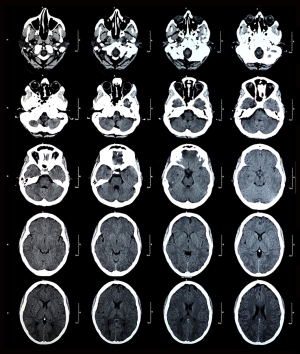by
John R. Fischer, Senior Reporter | August 17, 2018

AI can detect neurological conditions
on CT scans in less than two
seconds, says study
Scanning for neurological conditions may take little more than one second using an AI platform designed to identify a broad range of these issues, according to a new first-of-its-kind study.
Researchers at Icahn School of Medicine at Mount Sinai found that identifying diseases took as little as 1.2 seconds by applying AI to CT scans of stroke, hemorrhage, hydrocephalus and other neurological problems. The study is the first to demonstrate a direct clinical application based on the application of AI in detecting a wide range of acute neurological conditions.
"With a total processing and interpretation time of 1.2 seconds, such a triage system can alert physicians to a critical finding that may otherwise remain in a queue for minutes to hours," senior author Eric Oermann, instructor in the department of neurosurgery at the Icahn School of Medicine at Mount Sinai, said in a statement. "We're executing on the vision to develop artificial intelligence in medicine that will solve clinical problems and improve patient care."



Ad Statistics
Times Displayed: 172730
Times Visited: 3125 For those who need to move fast and expand clinical capabilities -- and would love new equipment -- the uCT 550 Advance offers a new fully configured 80-slice CT in up to 2 weeks with routine maintenance and parts and Software Upgrades for Life™ included.
Utilizing 37,236 head CT scans, researchers trained a deep neural network to identify if an image consisted of critical or non-critical findings. They then tested the ability of the solution to detect and notify clinicians of a disease as it triaged scans based on severity in a blinded, randomized controlled trial in a simulated clinical imaging environment.
The study relied upon "weakly supervised learning approaches" constructed from the researcher’s expertise in natural language processing and large clinical data sets within the Mount Sinai Health System.
The solution demonstrated a 150 times shorter time span, on average, in pre-processing an image, running its interference method and, if necessary, sending out an alert, compared to the average reading time of an image by a physician.
The next phase of testing will involve enhanced computer labeling of CT scans under the guidance of "strongly supervised learning approaches." It also will include novel techniques for increasing the efficiency of data.
"The expression 'time is brain' signifies that rapid response is critical in the treatment of acute neurological illnesses, so any tools that decrease time to diagnosis may lead to improved patient outcomes," study co-author Joshua Bederson, professor and system chair for the department of neurosurgery at Mount Sinai Health System and clinical director of the neurosurgery simulation core, said in a statement.
Researchers estimate integration of these changes within the system to be completed within the next two years.
The study was performed by the Mount Sinai AI Consortium (AISINAI), a group of scientists, physicians and researchers focused on developing and applying AI for accurate diagnosis and improved patient care. It further supports a paper published earlier this year by the group in the journal,
Radiology, on the use of natural language processing algorithms for identifying clinical concepts in radiology reports for CT scans.
The study is available in the journal,
Natural Medicine.

